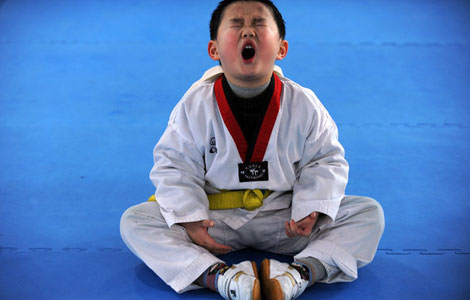National holiday can make a world of difference to business
Updated: 2012-01-20 07:38
By Andrea Fenn (China Daily)
|
|||||||||||
Spring Festival has ramifications for global trade, Andrea Fenn reports from Shanghai.
|
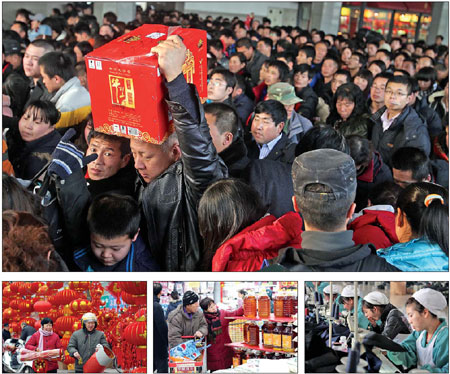 |
|
Clockwise from top: Passengers at the Beijing Railway Station head home for the lunar new year. Most Chinese factories will close for the holiday week after a burst of productivity. These women at a garment factory in Huaibei, Anhui province, make goods for export to the United States. Plans for family reunion meals prompt people like this couple in Binzhou, Shandong, to stock up on supplies. Decorations, like these in Fuyang, Anhui, set the atmosphere for lunar new year. Wang Jing / China Daily Lu Qijian / for China Daily Provided to China Daily |
With Lunar New Year just days away, most Chinese people are savoring a week of holidays, family reunions and feasting, charging up for the Year of the Dragon.
But when China's most important festive period shuts down the country's production system for a week, trade flows are disrupted and private consumption grows. The results are an inconvenience - or an opportunity - for different industries around the world.
China traditionally experiences a boost in production before Chinese New Year, led by greater demand for goods and services. The country's purchasing managers' index, which shows companies' purchase of goods and services, rose 1.3 points in December to 50.3.
That greater manufacturing activity dives once the holidays begin and some 250 million factory workers return to their hometowns. China's GDP in the first quarter last year was 14.3 percent less than the second, mostly due to the seasonal business closures.
According to Andrew Tilton, senior economist at investment banking firm Goldman Sachs, China's holidays have enormous impact on global trade flows because the country is the world's biggest exporter and on track to become the largest importer by 2014.
Tilton said that economists try to balance calculations assuming average timing, but Chinese New Year is a moving holiday. Out-of-average occurrences can produce stark effects on figures.
"Last year turned out to not show as big an impact, but with the Chinese New Year much earlier this year, there are likely to be more visible effects," Tilton said.
Materials and travel
Asia is where the effects are felt most strongly. China is by far the continent's biggest importer, and entire raw material sectors in the region depend on its industrial demands. For this reason, countries that do not officially celebrate the lunar new year, such as Australia and the Philippines, adjust their economic indicators to budget its impact.
Last year, Chinese imports from the Philippines fluctuated by 48.9 percent around the new year, showing strong correlation between the holiday and bilateral trade flows.
Australia's export of commodities such as metals and hydrocarbons is typically soft during the Chinese New Year but recovers strongly afterward. Last year, the holiday produced a 29.8 percent alteration in exports of liquefied natural gas. The profitable commodity has a business value to Australia of $54 billion.
The production of Australian wool, 70 percent of which goes to Chinese factories for garment production, is traditionally lower close to the lunar new year. Overall Australian wool output in the first quarter last year was 4.4 percent lower than the second quarter, due to lower demand from its biggest export market.
However, some raw material sectors also benefit from the festivities. Every year, Chinese steel producers replenish their stocks of iron ore from Australia before the week off, pushing up iron prices. This year's increase was 6.7 percent.
The holiday also puts the brakes on travel. China is the first source of tourism for Australia, with 1 million tourists expected annually by 2020.
"The Chinese New Year definitely affects travel from Australia because of higher air fares and a shortage of train tickets, coaches and domestic air tickets within China," said Helen Wong, principal of Helen Wong's Tours, a travel agency specializing in China-Australia travel. "Furthermore, the rapid growth of tourism within China, especially around the Chinese New Year, puts extra strain on business from outside China."
Gold and fancy cars
There's an economic upside to China's festive mood because it brings about greater consumption of high-end goods.
A study by consulting firm Bain & Co showed that the Chinese New Year is among the most important times for luxury purchases because the weeklong holiday gives Chinese buyers time to shop. With China now the second-largest luxury market, growing as much as 30 percent last year, the country's holiday indulgences have a strong impact on the market worldwide.
Gold is one of the commodities most positively affected by the shopping spree, and its impact is global because China accounts for more than 20 percent of total demand for gold jewelry, according to Jiang Yangjing, researcher at State-backed Chinese investment banking firm China International Capital Corp.
"The Chinese have a long tradition of giving gold jewelry as gifts to their relatives and friends," Jiang said. "Also, the Chinese New Year is the major wedding season."
The luxury car market, which rose 16 percent last year to become the world's second largest after the US, also gets a boost. Jenny Gu, analyst at research firm LMC Automotive, said the Chinese like to buy cars before the festivities so they can ride them during the holiday.
The higher sales are also due to a skewed production cycle. Automakers usually wholesale more cars a month before the new year, when production ceases, so dealers need to prepare their inventories to meet the stronger demand. Figures from BMW show sales increased up to 71 percent in the first quarter last year and were visibly rising in the past weeks as well, in correlation to the coming new year.
"Many customers still have the habit of making some major purchase decisions before the most important traditional holiday, either as a self-reward or to celebrate the lunar new year," said BMW China's corporate communication manager, Hollie Yang.
Food and drink
Bain & Co's research shows that giving gifts is one of the most important reasons for buying luxury goods, with personal and business presents accounting for 25 percent of luxury goods sales in China. It has become increasingly popular among China's middle class to give festive hampers with imported goods as presents, so the import of fine foods also grows sharply around the Chinese New Year.
"We sell a lot of really high-end products in this period," said Ivona Grgan, head of Hong Kong-based food importer Profood Ltd. "I think most Chinese eat Chinese food for the new year, but they do buy more imported fine foods for presents."
For the same reason, wine sales and consumption are usually higher, particularly for well-known brands, said Matthew Gong of ASC Wines, an import company. French Bordeaux winery Lafite, one of the most recognized wine brands in China, confirmed increased sales around the Chinese New Year although it didn't divulge the figures.
Hot Topics
Kim Jong-il, Mengniu, train crash probe, Vaclav Havel, New Year, coast guard death, Internet security, Mekong River, Strait of Hormuz, economic work conference
Editor's Picks
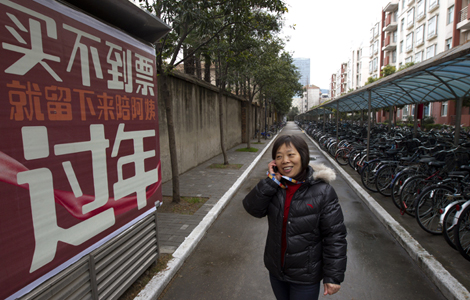
|
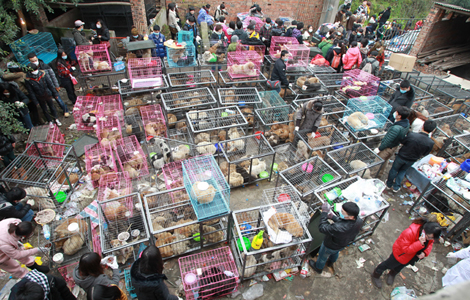
|
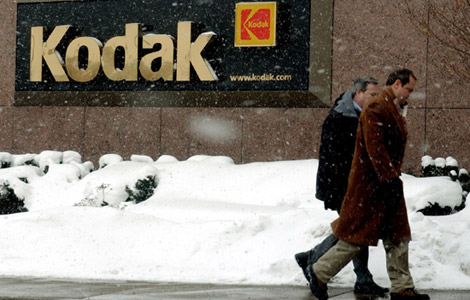
|

|

|

|





